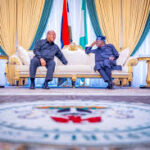Mali, Burkina Faso, and Niger Impose Import Levy to Fund New Sahel Bloc Amid Rift with ECOWAS.
By Raymond Enoch
The military governments of Mali, Burkina Faso, and Niger have introduced a 0.5% levy on imported goods, marking a significant step toward financing their emerging alliance, the Alliance of Sahel States (AES). The new measure, announced in a joint statement, takes effect immediately and applies to all imports, excluding humanitarian aid.
This levy, which extends to goods imported from other ECOWAS nations, is a direct result of the three countries’ departure from the Economic Community of West African States (ECOWAS). The revenue generated from the levy will fund the activities of the AES, which originally began as a security pact in 2023 but has since broadened its ambitions to include economic integration and greater political autonomy.
The move to impose the levy disrupts the previously established free trade within the broader West African region, underscoring the growing divide between the military-led governments of the Sahel and the democratic nations of West Africa, such as Nigeria and Ghana. The three Sahel nations had long accused ECOWAS of failing to support their fight against Islamist insurgents, which ultimately led to their decision to exit the bloc, despite facing severe economic sanctions aimed at pushing them to restore civilian governance.
Mali, Burkina Faso, and Niger, among the world’s poorest nations, have been struggling for nearly a decade with a violent insurgency led by Islamist militants associated with al-Qaeda and the Islamic State. The prolonged violence has resulted in the loss of thousands of lives, displaced millions, and left the populations disillusioned with their governments’ ability to restore peace and stability.
The imposition of the import levy is seen as a crucial step in the Sahel nations’ quest for political and financial independence, as they deepen their military and economic ties through the AES. Additionally, the trio is advancing plans for the introduction of biometric passports, further solidifying their aspirations for autonomy in both economic and political spheres.
As tensions between the Sahel and the ECOWAS nations mount, the implications of this move will be felt not just in trade, but in the shifting dynamics of West African geopolitics. With this new levy, the Sahel states are signaling their commitment to self-sufficiency and their determination to forge an alternative path outside the regional bloc.
.










